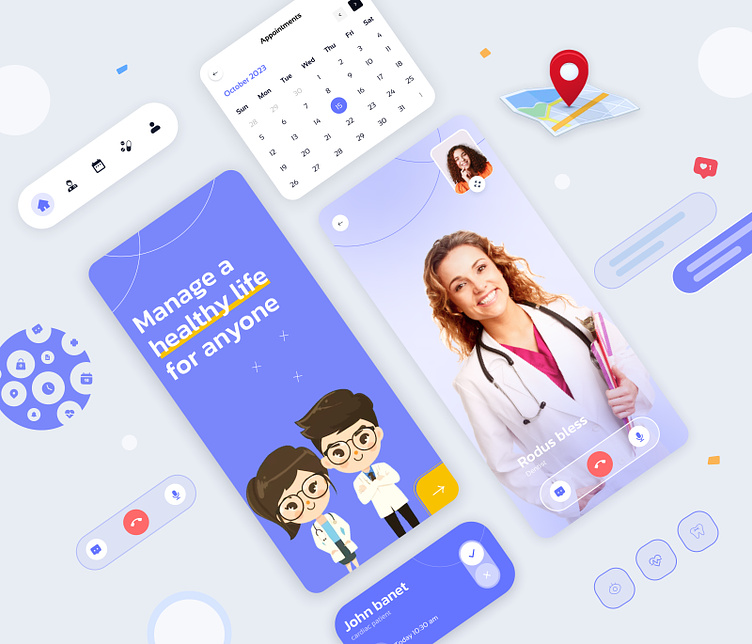As technology continues to reshape the landscape of healthcare, the year 2024 promises a new era of advanced features in healthcare apps. From personalized care experiences to cutting-edge diagnostic tools, healthcare apps are evolving to meet the demands of a rapidly changing world. In this blog post, we’ll explore the top advanced features that will define healthcare apps in 2024, enhancing patient engagement, improving outcomes, and revolutionizing the way we approach healthcare.
Table of Contents
1. AI-Driven Personalization:
In 2024, healthcare apps are taking personalization to the next level with the integration of Artificial Intelligence (AI). AI algorithms analyze user data, medical history, and lifestyle factors to tailor recommendations and treatment plans. From personalized medication reminders to dietary suggestions based on individual health profiles, AI-driven personalization ensures that healthcare apps become truly patient-centric.
2. Predictive Analytics for Early Detection:
The integration of predictive analytics is a game-changer in healthcare apps. By leveraging machine learning algorithms, these apps can analyze vast amounts of health data to identify patterns and predict potential health issues. Early detection of diseases or health risks allows for proactive intervention, significantly improving patient outcomes and reducing healthcare costs.
3. Virtual Health Assistants:
Virtual health assistants powered by natural language processing and AI are becoming indispensable in healthcare apps. These assistants provide users with real-time information, answer health-related queries, and even assist in appointment scheduling. The conversational interface enhances user engagement and accessibility, making healthcare information more readily available.
Also Check: AI in Healthcare: Drives Potential Enhancements across the Healthcare Sector
4. Remote Patient Monitoring:
With the increasing adoption of wearables and connected devices, healthcare apps in 2024 will offer comprehensive remote patient monitoring capabilities. These apps can collect and analyze real-time data from wearables, such as heart rate, blood pressure, and glucose levels. This continuous monitoring allows healthcare providers to track patient progress, make timely interventions, and provide personalized care plans.
5. Blockchain for Secure Health Data Management:
Blockchain technology is revolutionizing health data management, ensuring the security and integrity of sensitive patient information. Healthcare apps are utilizing blockchain to create decentralized and tamper-proof health records, giving patients greater control over their data while maintaining privacy and security. This feature enhances trust between patients and healthcare providers, fostering a more collaborative approach to healthcare.
6. Telemedicine 2.0 – Enhanced Virtual Consultations:
Virtual consultations are evolving beyond simple video calls. In 2024, healthcare apps are integrating advanced features into telemedicine, such as virtual examination tools. Patients can share high-resolution images or videos of specific symptoms, allowing healthcare providers to conduct more thorough virtual examinations. This advanced telemedicine approach enhances the diagnostic process and improves the quality of remote healthcare services.
Top Development Partners: Top 10 Healthcare App Development Companies
7. Augmented Reality (AR) for Medical Training and Visualization:
Healthcare apps are incorporating augmented reality to revolutionize medical training and patient education. AR can create immersive experiences for medical students, allowing them to visualize and interact with 3D models of the human body. For patients, AR can provide interactive explanations of medical procedures, helping them better understand their conditions and treatment options.
8. Genomic Health Insights:
The integration of genomics into healthcare apps is providing users with personalized insights into their genetic makeup and its impact on health. Users can access information about genetic predispositions to certain conditions, enabling proactive healthcare decisions and personalized preventive measures. This feature empowers individuals to take control of their health based on their unique genetic profile.
9. Chatbots for Mental Health Support:
Mental health is gaining the attention it deserves, and healthcare apps are stepping up to provide valuable support. Chatbots equipped with emotional intelligence and empathy are becoming integral in mental health apps. They offer users a confidential space to express their feelings, receive coping strategies, and access resources for mental well-being. The anonymity of chatbots encourages more individuals to seek mental health support.
10. Continuous Learning Algorithms:
Healthcare apps in 2024 are equipped with continuous learning algorithms that adapt and improve over time. These algorithms analyze user interactions, feedback, and outcomes to enhance the accuracy of diagnostic suggestions, treatment plans, and health recommendations. Continuous learning ensures that healthcare apps stay relevant and effective in an ever-evolving medical landscape.
Conclusion:
The advanced features in healthcare apps in 2024 represent a paradigm shift in the way we approach healthcare. From AI-driven personalization to the integration of blockchain for secure health data management, these features are poised to enhance patient care, improve outcomes, and promote a more proactive and personalized approach to health and wellness. Find a top rated healthcare app development company to develop your app. As we embrace the future of healthcare technology, these advanced features are not only transforming the user experience but also contributing to the evolution of a more connected, accessible, and patient-centric healthcare ecosystem.

